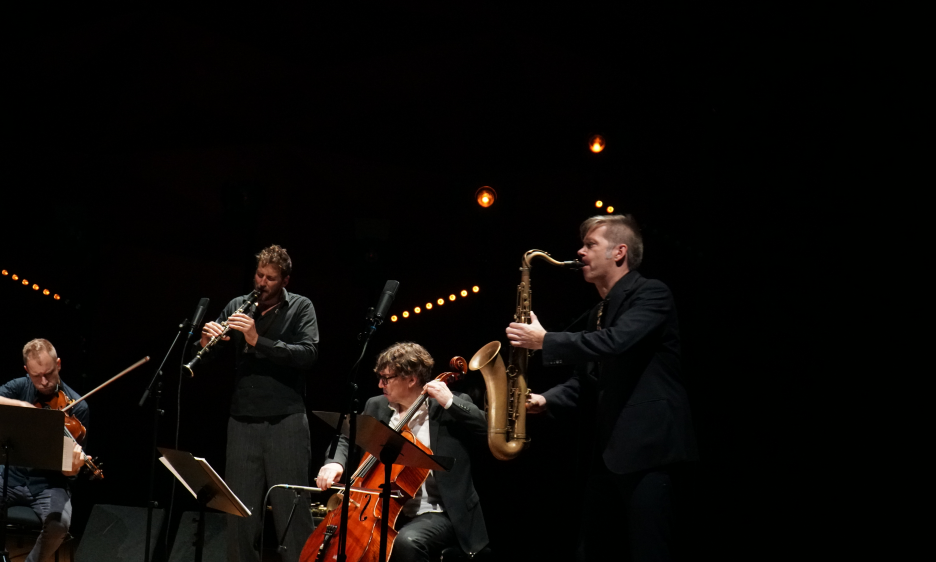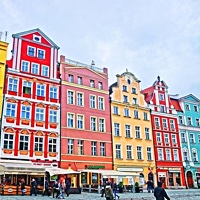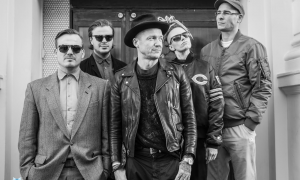Home » Jazz Articles » Live Review » Jazztopad 2019
Jazztopad 2019

Witold Lutoslawski National Forum of Music, Mleczarnia Club
Jazztopad
Wroclaw
November 21-24, 2019
On my arrival in Wroclaw, on the way to the reverend National Forum of Music (NFM), the first familiar face I met in the street was Mateusz Rybicki, a musician that has for years played an admirable role on the nightly communion side of NFM's two-week long Jazztopad Festival. I came there to catch part of the second week of the festival, arriving a day after the Austrian day with chuffDrone and Shake Stew. Running into Mateusz in the street, I took it as a good sign for the November days and nights coming. Wroclaw has been a good place for me to learn about exciting unknown music and to deepen knowledge of known musicians and their music. Wroclaw also surprised me time after time by presenting musicians of my highest esteem—often as the first festival in Europe, which felt as a complicité télépathique. But howsoever, Jazztopad reasons and acts big and in-depth. It has introduced me to a lot of new musician(s) and has a fine communal side, manifested through the six living room sessions in private houses on the final Saturday and Sunday of the festival, among other stagings. At these intimate sessions, festival artists play in unusual combination among each other and with Polish musicians and Wroclawian audience and foreign audience meet too.
And, to shortly stand still by another aspect of Wroclawian cultural life, 2018 Nobel Literature Prize winner Olga Tokarczuk, former citizen of Wroclaw and now its Honorary citizen, regularly returns to the city. In the month before the beginning of Jazztopad, as a move against spreading hostilities against her, Wroclaw's public transport company promised free transport for every person carrying a book of Tokarczuk.
Trails and highlights
Form, structure and procedure in music can appear more or less clear cut and schematic, marking a field for music to unfold within along more or less pre-drawn lines. The most lucent highlight of the concerts I saw at Jazztopad 2019 was a stupefying and liberating example of how a consistent whole can get sparked through a series of loose stepping-stones and thereby can find itself in an organic way, all accomplished by the trio of French cellist Vincent Courtois with the two reedists Daniel Erdmann and Robin Fincker together with NFM's own Lutoslawski String Quartet. Key factors here were melody and czysta radość z grania: pure joie de jouer/reine Spielfreude/pure joy of playing.The Lutoslawski String Quartet can look back on an impressive series of collaborations with festival artists through the years, among others, with Amir ElSaffar (2018) with Charles Lloyd (2017) , with Jason Moran (2016), with Sylvie Courvoisier and Mark Feldman (2015) and with Vijay Iyer, Uri Caine, John Taylor and Kenny Wheeler. So, why always Kronos Quartet? It would not look out of place to have some of this music on an album.
Other highlights (for me) on the axis between the grandeur of NFM concert hall and nocny blask (night shimmer) and the basement dust of the Mlezarnia Club were Polish/Australian trio Sun Dogs and Canadian Longhand Trio of guitarist Tony Wilson with bassist Russell Sholberg and drummer Skye Brooks. Both trios incited the late-night spirits and pushed them on to higher stars in the firmament.
The Courtois configuration, the Longhand Trio and the Anouar Brahem Quartet made up a specific mood and melody trail. It was augmented and completed by two more trails: a cosmological-cosmopolitan trail taken by Wadada Leo Smith and Vijay Iyer, by Nicole Mitchell's Artifacts Trio and Danilo Pérez Global Messenger Unit plus a Polish power trail, opened and driven through by Sun Dogs, pianist Grzegorz Tarwid and Power of the Horns ensemble led by trumpeter Piotr Damasiewicz.
Mood and melody trail
A trio of cello and two saxophones with a string quartet? It is not too difficult to make up an idea what it could be and how it would sound. However, what happened went beyond possible preconceived concepts. Vincent Courtois started alone on the stage, energetically exposing a captivating deep melodic theme in his characteristic bright vibrato-less tone, went off stage, and in walked Piotr Tarcholik (1st violin), Marcin Markowicz (2nd violin), Artur Roszmysłowicz (viola) and Marcin Młodawski (cello), the musicians of the Lutoslawski String Quartet to play 166 aspects of the theme as a stunning, surprising puzzle for the alertly listening audience. It was a loose series of stories within stories, pieces abstracted from the preceded expository tune in fascinating varied ways ranging from Terry Riley and Steve Reich-like variations to Helmut Lachenmann type of edgy 'material' sounds. It created a great sense of stimulating discontinuous continuity. In the next phase Courtois himself joined them. In a wild game they now spurred and fired each other on. A break, then, and the trio entered the stage and intoned, stated the melodic theme in clear bright colors and truly vital interactive orchestration rising from a richly filled, not drying up, cornucopia. Step by step, the pull increased, not only binding it together, but making it finally explode ... by all seven musicians together raving freely and wildly exuberant on the beautiful grid of the expository melody.A night flight on the mood and melody trail, that's what mythic Vancouver bird Tony Wilson did with his Longhand Trio of Russell Skolberg and Skye Brooks down in the basement of Mleczarnia club: simply good music, truthful with a captivating flow—an experience of pure joy to watch and listen to. As a contrast, the concluding concert of the festival by the popular Anouar Brahem Quartet was the stark opposite of the Courtois and Wilson case. Its music was clearly for the calm minded ones among us. It was missing the subtlety I know of Brahem and the music had a somnolent effect (for parts of the audience) in the long run. It was a pity that his gifted fellow musicians, bassist Björn Meyer, clarinetist Klaus Gesink and percussionist Khaled Yassine were underused and so had little chance to inject and fire up with their potentials.
Cosmological-cosmopolitan trail
This was the trail taken by trumpeter Wadada Leo Smith and pianist Vijay Iyer, by flautist Nicole Mitchell and her Artifacts Trio as well as the Danilo Pérez Global Messenger Unit.Wadada Leo Smith is a master of enlivening shades and shadings of sound, of the radiation and migration of sound through experiential space and time, of awakening our sonic senses in the stream making emerging sounds sounding. It is happening in a grounded, open, and, also, an inevitable way. Experiencing the moment teaches you it is all, and never absolute. It is also something to listen to the grateful patience of his talking. Vijay Iyer is somewhat the opposite in his manners of talking and smiling. In the sphere of musical vibration, they connect with each other on a deep level and illuminate the movement(s) we are all bound to and are entangled in. After the concert in the big hall of NFM I still (now) have the desire to sense those arrows in a more intimate room.
Flautist Nicole performed with her Artifact trio of cellist Tomeka Reid and drummer Mike Reed together with another NFM string ensemble, the 17-piece NFM Leopoldinum Orchestra. The performance surely had its very own signature and the string ensemble could tune in easily to all parts. Even more, the dynamic enthusiasm and joy the musicians showed in the second part was especially infectious and catching. The work brought known things in a renewed context with its own dynamics. For example, traces of "Shaft" enriched with neo-romantic tingles or a bit of van Beethoven seeping in. It was, however, also a bit overloaded/unbalanced and in my ears, it was lacking a higher amount of confluence with the string ensemble.
Panamese pianist Danilo Pérez, known from his role in the Wayne Shorter Quartet, is an engaging educator and a peace activist involved in connecting people(s). All three sides of his mind and soul come together in his Global Messengers ensemble, consisting of five of his students rooted in a multitude of musical cultures. Vocalist Farayi Malek and cellist Nasem Alatrash are from Palestine, violinist Layth Sidiq is from Jordan, Vasilis Kostas laouto is from Greece and vocalist Farayi Malek is from the US state of Idaho—an ideal southern Western-Eastern combination considering one of the famous 'Eastern' compositions in jazz, "Caravan," written by Puerto Rican trombonist Juan Tizol for the Ellington orchestra.
Working in an ensemble with such a diversity of voices is a valuable and highly challenging affair. The performance didn't reveal as a smooth, perfect integration of the diversity of influences but rather as a still abrasive, skewed thing with loose edges and ruptures. This can be considered an advantage, preventing a lot of pitfalls, and keeps the music open and challenging in its further development. The foil of Coltrane's "Love Supreme" shone through now and then even as maqam elements. The musicians were equipped in different degrees for the challenges of this flexible venture. In particular, the Greek laouto, a long-neck lute with (re)movable frets and a brighter tone than the oud, is in need to further figure out its best suited place in the ensemble's music. The process of finding the music's place and for every musician to find her or his place in the shifting music is still ongoing. Music and musicians received a deserved friendly welcome and warm applause.
Polish power trail
Mleczarnia Club's basement in Ulica Pawla Wlodkowica, five-minute-walk from NFM, is a place of positive tension, of openness and the unforeseen in many respects. Through the years it has become a magic campfire site where musicians meet, mesh, entangle, knit, knot, untie, where musicians spearhead, undermine, go bananas and find solutions to not yet existing problems. Sundogs is the heartbeat of this nightly basement gatherings of the festival that keeps it running at high intensity. Clarinetist Mateusz Rybicki, bassist Zbignew Kozera and drummer Samuel Hall play there each night with festival musicians from 11:00 p.m. often until 4:00 or 5:00 a.m. deep into the night with astounding unrelenting creativity. I know of few such resilient musicians. They are the unflagging sound partisans of Wroclaw. They also played in the upper world of the festival as a group and as side men. Zbignew Kozeras participated in the concert of Nicole Mitchell and Samuel Hall is the drummer of Power Of The Horns (see below). The three musicians were also the backbone of the living-room sessions in private houses taking place on the final Saturday and Sunday.Polish pianist Grzegorz Tarwid is a phenomenon, but which Polish pianist isn't that? His solo recital seemed to be a speed record attempt from the first note, whereby producing overlaps of repetitive sequences. It evoked tensed expectations, but after ten minutes it became dull ... The second piece was more promising and thrilling but still grafted on high speed execution and so it went on. Grzegorz Tarwid, an enfant terrible? No mood-generating romantic at all, anyway. That distinguishes him clearly from a large number of his young fellows. His touché was hard and unpleasant, seemingly careless. Moreover, the music turned out more and more as a way of artful running on the spot. As provocative as this was, coherence was lacking in the long run. Maybe Tarwid wasn't lost, but I was, and didn't find my way into it.
Comandante Damasz, trumpeter Piotr Damasiewicz, is a character and a force of the scene. He also is a regular of Jazztopad undertakings. So, this time he gathered the well-known troupe Power Of The Horns, a nine-piece herd to fire up the large main hall of National Forum of Music on the occasion of the release of the troupe's latest album Polska. The troupe comprised the saxophonists Adam Pindur, Macief Obara and Gerard Lebik, trombonist Pavel Niewiadomski, pianist Grzegorz Tarwid, the two bassists Kuba Cywinski and Ksawery Woicinski and drummer Samuel Hall. It became a steaming meal, an expansive manifestation underscored by a narrative in Polish in broad gestures, referring to musical ancestors, and to general Polish history. The herd -at the furioso end of the show, extended by three Polish musicians on African percussion and guest saxophonist -sent wave after wave of whirling body and soul of the audience. And the audience's reaction? It obviously stirred, yelled, jumped up and celebrated the music and their musicians. It took a bit long, yes. Shorter would have even been stronger, but this kind of elongation can happen when... when there are too many solo's... when you are wearing too many hats, and when you try to serve too many conflicting forces.
Konkluzja/conclusion
The attended part of the Jazztopad 2019 program with its three trails and related branching was as wide as it was in-deep not shying away from edges. For the experiential quality of a festival program a productive and attractive balance of diversity, variation and sharpening/cutting edge potential is a crucial thing. Jazztopad with a strong underlying rationale and compact formula got quite far in it. The way of presenting and the mode of performing should and will play an important role in the future. A special example was the appearance of the Vincent Courtois Trio with the Lutoslawski String Quartet. Jazztopad has already set other steps by staging more configurations at Mleczarnia Club. This and other programs can also be measured in the programming triangle of three potentialities: challenge potential, artistic development potential and entertaining potential and inside the triangle the spherical factor and performative quality/surplus.Photo Credit: Henning Bolte
Tags
Live Reviews
Henning Bolte
Poland
Wroclaw
Vincent Courtois
Daniel Erdmann
Robin Fincker
Amir El Saffar
charles lloyd
jason moran
Sylvie Courvoisier
Mark Feldman
Vijay Iyer
Uri Caine
John Taylor
Kenny Wheeler
Tony Wilson
Russell Sholberg
Skye Brooks
Anouar Brahem
Wadada Leo Smith
Nicole Mitchell
Danilo Perez
Grzegorz Tarwid
Piotr Damasiewicz
tomeka reid
Mike Reed
Farayi Malek
Juan Tizol
Adam Pindur
Macief Obara
Gerard Lebik
Pavel Niewiadomski
Kuba Cywinski
Ksawery Woicinski
PREVIOUS / NEXT
Support All About Jazz
 All About Jazz has been a pillar of jazz since 1995, championing it as an art form and, more importantly, supporting the musicians who make it. Our enduring commitment has made "AAJ" one of the most culturally important websites of its kind, read by hundreds of thousands of fans, musicians and industry figures every month.
All About Jazz has been a pillar of jazz since 1995, championing it as an art form and, more importantly, supporting the musicians who make it. Our enduring commitment has made "AAJ" one of the most culturally important websites of its kind, read by hundreds of thousands of fans, musicians and industry figures every month.

























